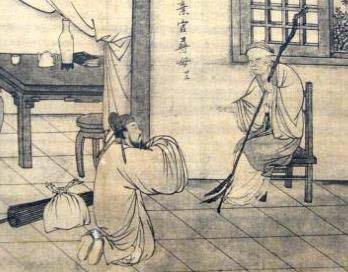Filial piety is a time-honored tradition in Chinese culture. Chinese history abounds with stories of selfless sacrifice by offspring for their parents.
In 399 to 402 A.D., during the Eastern Jin (東晉) Dynasty, Sun En (孫恩) led a rebellion. Pan Zong (韓綜) and his father Pan Piao (潘驃) left their county Wu Xing (吳興) to flee from the turmoil.
Old age and weak body slowed Pan Piao down, and the bandits eventually caught up with him.
“I cannot run anymore. You better run and escape by yourself in order for us not to be killed together,” Pan Piao told his son. He then sat on the ground unwilling to move.
Instead of leaving, Pan Zong stayed put and faced the bandits. He kowtowed to them and pleaded, “My father is of old age. Please spare his life.”
Pan Piao, in turn, told the bandits: “My son is still young. He could have escaped but did not because of me. My life does not matter. Please just spare my son.”
The bandits were unmoved. One of them raised his sword and tried to hack Pan Piao. Pan Zong immediately threw himself to cover his father with his body. The bandit struck Pan Zong, leaving him with four wounds in the head and face. He lost consciousness.
At this moment, a bandit came forward and said: “This man sacrificed his life to save his father. He is a dutiful son, full of filial piety, don’t hurt him. Killing a man of filial piety is unlucky.”
The other bandits were convinced and let go of Pan Zong and Pan Piao.
The filial piety of Pan Zong made the bandits spare his and his father’s lives. Filial piety in Chinese is xiao (孝), pronounced in Hokkien as hao.
As this tale shows, it is more than respecting and following one’s parents, elders and ancestors. Pan Zong demonstrated it is also the willingness to sacrifice one’s life for them. — First published in Tulay Fortnightly, Chinese-Filipino Digest 29, no. 4 (July 19-August 8, 2016): 5.





